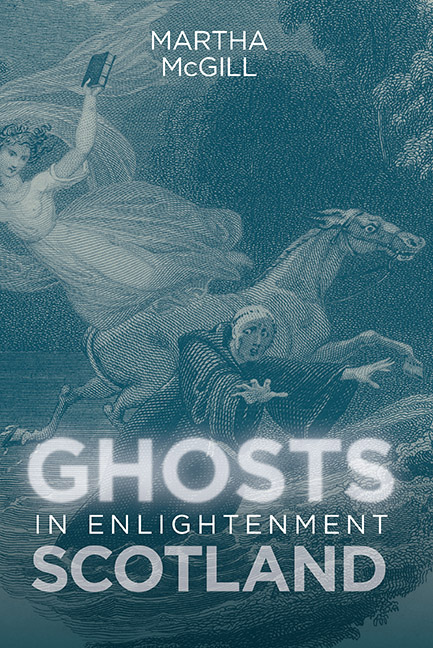Book contents
Chapter Four - Gothic and Romantic Ghosts
Published online by Cambridge University Press: 12 October 2019
Summary
Yea, when the cold blood shoots through every vein:
When every hair's-pit on my shrunken skin
A knotted knoll becomes, and to mine ears
Strange inward sounds awake, and to mine eyes
Rush stranger tears, there is a joy in fear.
Thus speaks Joanna Baillie's Orra, a fourteenth-century noblewoman with a penchant for ghost stories. At her bidding, her ladies-in-waiting send her into transports of fear with their stories of ‘things unearthly’ that ‘rise from the yawning tombs’. One of these ‘things unearthly’ is the ghost of a noble knight, who went hunting in the Black Forest. The Count of Aldenbergh, a cruel ancestor of Orra's, tricked this knight into staying in his castle, and murdered him while he slept. Thereafter, local peasants reported sightings of spectral hunters and hounds, racing through the forest at midnight. The knight himself was said to sound a horn three times at the castle gate, before making his passage inside, seeking some descendant who could release his spirit. In due course, Orra is sequestered in this ill-omened castle, while a conniving villain attempts to prey upon her virtue. The ghost that subsequently appears is actually the hero come to save her, but Orra's weakened mind is driven to frenzy.
Written in 1812, the sorry story of Orra demonstrates an alternative trend in the presentation of ghosts. In the late eighteenth and early nineteenth centuries, the gothic and romantic movements placed new value on ghosts’ emotive power. This chapter identifies two significant trends. By the first of these trends, ghosts became a shortcut into an uncanny world. They were used to reflect on universal themes, particularly madness, death, and the supernatural fear that Orra relishes. The second trend saw ghosts tied to a specifically Scottish present and past: they were employed to celebrate folk culture and to evoke the watchful presence of older generations. The ghosts of the first category usually featured in literary works in the gothic style. Those of the second category formed part of the romantic project of nation-building, and appeared in both works of fiction and folkloric studies. This is not to imply, however, that gothic and romanticism are clear-cut categories; the precise meaning of the terms is disputed, and there are plenty of areas of overlap.
- Type
- Chapter
- Information
- Ghosts in Enlightenment Scotland , pp. 117 - 158Publisher: Boydell & BrewerPrint publication year: 2018



